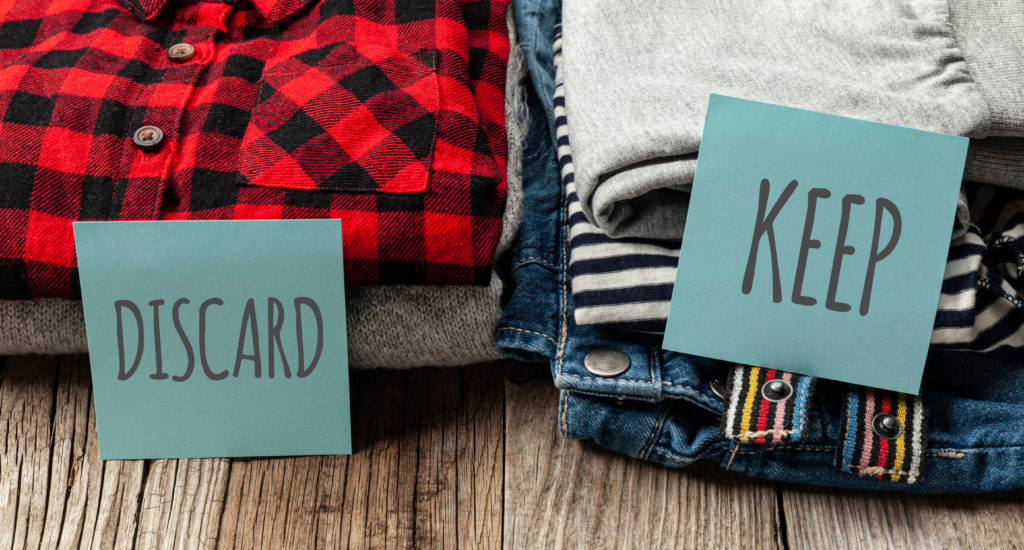Can leading retailers help empower consumers to shop guilt free and make a positive environmental difference?
How does the fashion industry gently nudge consumers towards sustainability without making them feel bad about shopping? Perhaps more importantly, how do brands build sustainability into the shopping experience without losing sales?
We’ve looked at the retail sector to discover some of the best ideas out there. How are the best bands in the world making sustainability a positive part of their consumers’ shopping experience?
From April 2022, diners at large chain restaurants in the UK were suddenly presented with menus that included the calorie content of each food item. The addition of this small piece of information is expected to change the way people make decisions about their diet. According to the government, this change was to help people make informed healthier choices.
However, for many diners, it’s an unwelcome addition that makes them feel guilty about their choices. Can the fashion industry avoid the same fate?
Incentives versus guilt
Away from food, how do we make responsible choices that better serve us and the needs of the planet?
Guilt, personal choice, collective responsibility and freedom are four aspects of our daily lives that often pull us in different directions when we need to make buying decisions. When it comes to clothes shopping, we enjoy personal choice and the freedom to buy and wear what we like. While we are gently encouraged to shop responsibly and be mindful of the impact of our collective purchases on the planet, when our choices are socially irresponsible we feel guilt or shame.
Brands shaping the consumer shopping experience need to find ways of making us feel good about our purchases while further fueling the crisis. They need to use incentives.
Some brands have found smart, innovative and effective ways of helping their consumers feel sustainable, environmentally positive and empowered without discouraging them from spending.
Here is our guilt-free list of the brands that built sustainability into the shopping experience.
H&M’s garment collection programme
One of the world’s biggest fashion retailers in the world, H&M often comes under fire for not doing enough to support global fashion sustainability drives. However, since 2013 its garment collection programme has been the biggest and most effective way of diverting unwanted clothing from global landfills. In 2020 they collected 18,800 tonnes of clothing which was then either resold, repurposed, or recycled.
To make this a positive part of the consumer shopping experience H&M offer their customers discount vouchers as an incentive. By encouraging their shoppers to responsibly dispose of old unwanted fashion they are creating an opportunity for shopping to become a positive sustainability story.
Beyond managing waste, H&M is also working to educate consumers so their purchases last far longer. From sewing shorter hems to replacing buttons and applying patches, they have a full programme of guides to help shoppers get the most out of their new clothing. In addition to repairs, there are really useful washing tips, drying and even ironing that can help delicate and synthetic materials stand the test of time.
Between a voucher-driven recycling programme and handy care guides, H&M are involving their shoppers in a process that is striving to reduce the amount of clothing that goes to waste. By engaging with the shoppers through social media, in-store, before and after the sale, H&M is creating a positive consumer journey that offers viable alternatives to throwing old clothes in the trash.
Patagonia’s activism and environmental mission
From the moment a shopper arrives at the Patagonia website they are confronted with the brand’s strong ethical and sustainable vision. As a brand that is closely associated with an outdoor lifestyle, adventure and nature they know their primary consumers are likely to care strongly about the planet.
Square in the centre of the homepage is a button labelled ‘Activism’ that directs shoppers to support local charitable initiatives. For a moment, we shoppers are no longer looking for a top but instead are becoming activists ourselves, finding a cause that we too can champion. Patagonia has cleverly positioned itself as more than just a clothing store. Instead, they represent a social mindset, a vision for a better future and a more kind, socially responsible, environmentally conscious shopper.
Besides creating a community of activists, they have taken very real practical steps to make the world a better place. All of which are part of the customer shopping experience as they browse the site. Shoppers can read how, Since 1985, Patagonia has pledged 1% of sales to the preservation and restoration of the natural environment. They’ve awarded over $140 million to environmental groups making a difference in their local communities. Conversely, they can read how the apparel industry contributes 10% of the pollution driving the climate crisis and how apparel makers frequently rank amongst the worst paid workers in the world. Patagonia states these facts openly and honestly before making its pledges and environmental mission clear.
After identifying the problem so directly they make it clear that shopping with them is the solution to the problem. 94% of their lines use recycled materials, their cotton is organic, their workers are paid a fair wage and their worn-wear programme makes buying second-hand clothing socially acceptable and even desirable.
Mood of Thought’s recycling drive
A new UK fashion brand, Mood of Thought was founded with sustainability and ethical consumerism at its heart. By always emphasising circular manufacturing practices and sustainability they are appealing to people who shop carefully, buy infrequently but seek out the very best. The website offers a steady drumbeat of information that reiterates the positive impact of the consumer’s purchase. From the buttons made from “renewable Corozo from the Tagua Tree” to the Silicone-free kraft packaging tape, made with a natural rubber adhesive every detail is there to reassure the shopper.
Perhaps smartest of all, Mood of Thought has sought to empower its shoppers by providing them with the tools required to actively eliminate landfill waste. Every purchase is delivered in environmentally friendly packaging with a Thrift+ bag enclosed. With this bag, shoppers can look through their wardrobe and select items they no longer want or no longer wear. These can be sold or donated through the easy-to-use Thrift+ platform.
By offering their consumers a practical solution to deal with excess fashion waste Mood of Thought is empowering the shopper and building sustainability into their shopping journey.
Boohoo ditch free returns
Boohoo is the fast-fashion brand you might not expect to see on this list, but one which may be about to reshape the fashion industry for the better. Alongside brands such as Next, Uniqlo, and Zara, Boohoo is ditching free returns.
At first, this can easily be seen as a negative for the shopping experience. Free returns have allowed consumers to try on a wide selection of clothing and clothing sizes from home and send back the unwanted pieces. Ideal for the home shopper but disastrous for the company, the clothing and the planet.
A recent Guardian article highlighted the issue: “When clothes are returned, they’re likely to be thrown away rather than resold. In the US, 2.6m tonnes of returned goods end up in landfill every year, generating 15m tonnes of carbon dioxide emissions annually.”
Add to that the processing and packaging, the logistics and transport costs and the free returns process is another way the fast-fashion industry is causing irreparable harm to the planet.
Boohoo and most other retailers who have introduced returns fees have tried to frame it as an act of corporate responsibility like the charge for plastic bags in supermarkets or the removal of plastic straws from fast food restaurants. Realistically, it is more to do with mitigating costs. But whatever the motives, the shopper is finally forced to think twice before buying excessive hauls of clothing. Why is this good for the Shopping experience? It is emphasizing the need to shop with care, buy quality and steer clear of excess. Ultimately, behaviors that lead to less guilt and shame and a more responsible shopping experience.
Wacoal Lingerie make it easy to get a perfect fit
Founded in 1985, Wacoal is America’s most trusted lingerie brand when it comes to quality, fit and comfort. After pioneering in-person measuring and fitting techniques that resulted in relief and comfort for so many customers, the company looked to see how they could repeat the experience online without losing any accuracy or fit.
Other lingerie brands such as the British retailer Figleaves had previously introduced an online fitting assistant to speak with shoppers before they confirm their purchase. While effective (with the company’s chief executive saying that returns have dropped) it was a potentially awkward conversation for the shopper.
Wacoal wanted to find a way of simplifying the experience. They sought a private, secure and safe software solution that could digitally capture accurate measurements and make trusted recommendations.
Sizer provided the expertise and technology and Wacoal integrated it seamlessly into the online shopping experience. Now shoppers can incorporate a simple body scan while shopping that accurately gauges their size and shares only the essential raw sizing data with the brand.
With lingerie being so intimate, returns in this category of clothing are more difficult to process and costly to recycle. By empowering women to shop with confidence online and reduce their need to try on a haul at home and return unwanted sizes, Wacoal was able to address a major problem with online shopping for lingerie and the fit, sizing, and returns issues that reduce a brands ability to be sustainable.
The feel-good factor.
What all these brands have in common is that they are creating opportunities for their shoppers and consumers to make better choices. From recycling old clothes to supporting charities, or buying less apparel, in the right sizes and rejecting free returns, each company offers the public simple steps they can take to do their bit.
With returns, by framing what was once an inconvenience as a positive environmental responsibility, consumers can be proud of the little steps they are taking to mitigate the waste or energy use. Likewise, with technology, consumers can get their sizing right the first time and eliminate the back and forth that adds more CO2 to the atmosphere.
The brands that do it best, spell it out loud and clear so their consumers know and understand that shopping with them is sustainable, ethical and positive. If they do it right, like Mood of Thought and Patagonia, their consumers become true advocates; a happy tribe of loyal shoppers who feel good about actively making the world a better place.
Never Miss Out
Sign up to receive our latest news and insights

Thank you!
we’ll keep you updated




